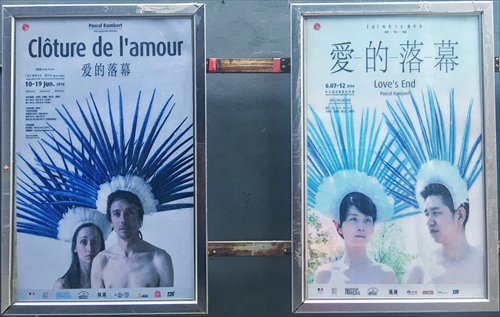
Posters for the French (left) and Chinese versions of Love's End (Photo/ GT)
"There's a huge desire," Pascal Rambert, French writer, choreographer and director for stage and screen, told the Global Times when describing France' passion for Chinese culture. It's a two-way street, as China shares the same passion for French culture, no matter if it's the art of theater, cinema or music.
This passion can be seen at the ongoing 2016 Festival Croisements (April 29-June 29), an annual Sino-French cultural exchange event that sees French artists perform across China.
As part of the festival, Chinese audiences will have the opportunity to see Rambert's globally successful theater play Love's End (Clôture de l'amour).
In addition to the original French version, a Chinese version performed by Chinese actors and actresses is also making the rounds.
Love's End was written in 2011 for the 65th Festival d'Avignon. It went on to win several awards in France. It has also been performed around the globe and been translated into nine languages.
The play features a couple, each of which tells the story of how their relationship ended through an hour long monologue. Audiences witness their personal moments as each character revisits the past and explains why they left each other.
In this monologue-filled stage play, language is Rambert's most powerful tool. He said he actually wrote the play specifically for Stanislas Nordey and Audrey Bonnet, the French actor and actress who first performed the play.
While the tailored nature of the script is one of its strengths, it presented a challenge when translating it into Chinese.
The 54-year-old Rambert, who served as the director of T2G, Théatre de Gennevilliers, confessed it was more difficult to translate the play into Chinese than other languages, since Chinese is so different from other Western languages. With the help of the producer of the Chinese version, Liang Dandan, and translators Chow Ling-chih and Sun Yucheng, they revised the script over and over again to ensure the translation could capture the heart of the original.
In the end, although Rambert couldn't understand what the Chinese actor and actress were saying on stage, he said he was perfectly capable of understanding that they had captured the original script by watching their body language.
"That is what I have been doing since 17. I know this play by heart," Rambert said.
Chinese actor Song Qingnan and actress Mi Le auditioned for Rambert in early 2016 in Beijing. Although not well-known performers, Rambert said that he was moved by their performance.
"I was not looking for someone that fits the role," Rambert said, going on to explain that what he actually wanted were players who could touch him.
Other translations of the play have been well received. A critic review of the English version performed in New York on Time Out New York wrote, "Love's End drives us through irritation to fascinated suspension and even a creepy, rubber-necking excitement. It takes patience to watch, but its rewards are intriguing - if incredibly bitter."
Rambert believes the emotions in this play are universal, which allows it to be understood by audiences in different countries, although their reactions to the play may be different from each other.
He recalled that when the show was performed in Moscow, a man from the audience stood up and left, because "he was not comfortable seeing a woman talking to a man like that." He of course was referring to the coarse words and yelling that are part of the female character's monologue.
However, in Italy there were women in the audience who stood up and shouted "Bravo! Bravo," for those same parts.
Rambert told the Global Times that he was looking forward to the reactions of Chinese audiences.
The French version of Love's End will be performed in Beijing, Shanghai and Tianjin from June 10 to 19, while the Chinese version will be staged at the Penghao Theatre in Beijing from June 7 to 12.


















































